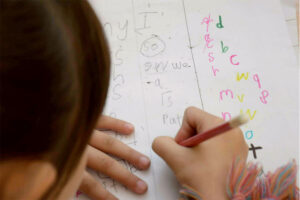01 .
Home
Evaluation & Management For Dyslexia
“Dyslexia is based on learning difficulties that cause a child to experience problems with reading, spelling and in some causes handwriting issues.”
For the evaluation of dyslexia you need a professional with a deep understanding about language development. We use standardized tests and gather qualitative feedback to make a diagnosis. Evaluation results provide us the basis of IEP(individualized Evaluation Plan) for a child.
“An estimated 80% of individuals diagnosed with learning disabilities have difficulty in various aspects of reading, comprehension and written expression.”
True evaluation of dyslexia should include a series of standardized tools. It will help us determine how the child performs relative to a normal sample. But this is not enough. If your child is struggling with decoding and spelling of words, an examiner should determine if they have some difficulties with phonological processing. “Phonological processing is breaking down aural language (language we hear) into smaller components like words or syllables. ”
Many reading disabilities are fixed with language processing and they should be measured in the right way. Three aspects for phonological processing are
- Phonological awareness
- Phonological working memory
- Phonological retrieval
From the above components, if any one is below average, reading, writing and spelling are often impacted.
A child with dyslexia may also have other issues such as:
- Poor short term memory
- Problem concentration and short attention span including ADHD
- Poor time management
- Dyspraxia (difficulty in activities requiring coordination and movement
While dyslexia is a lifelong problem there’s a range of specialist educational interventions that can help children with their reading and writing. After the evaluation of dyslexia, the most important task is to make a plan (IEP), keeping in mind areas that are average or below average in results. This is to describe how the child will learn and what the teacher needs to know in order to help them understand and learn more effectively. This will be beneficial and helpful for children to cope with difficulties.
Here are some treatment options for dyslexia:
Extra help:
A trained teacher or professional can teach your child different techniques based on their academic and organized study skills.
Accommodations:
Classroom accommodations should be given, for example, more time to complete their assignments or tests. Work on their attention and memorization through different activities like mazes, puzzles etc. We can also use different computer applications.
Therapy:
Some children also benefit from occupational therapy which might help improve their motor skills, leading to a decrease in writing issues.
Medication:
Your child’s doctor might recommend them some medication to overcome or manage depression and severe anxiety which can be caused due to dyslexia.
Make reading fun:
Reading should be pleasurable, not boring. Use books that your child is interested in and make sure the environment is relaxed and comfortable. Parents have a major role in boosting their child’s confidence, so encourage and support your child as they learn.
Make Workplace Adjustments:
Reading is frustrating for many people with dyslexia because letters can appear to be dancing around the page. Thus, if you are handing out printed materials, using a colored background can be enormously helpful. Your dyslexic child can tell you what background colours and contrast works best for them.
Visualize your concepts:
Many people benefit greatly from visualizing the information they study. Give attention to the photographs, charts, and other graphics in your textbooks. If you don't have visual cues to help, try creating your own. Draw flow charts or figures in your notes or use highlighters or pens in different colors to group related ideas in your written study materials. This will be helpful in memorization and make studying more fun and colourful for the child.
Read out loud:
Research published in 2017 suggests that reading materials out loud significantly improves our memory. Educators and psychologists have also discovered that having students actually teach new concepts to others enhances understanding and recall.
Review your lesson before going to sleep:
It would be helpful for students to review material right before going to sleep at night. Research has shown that information studied this way is better remembered. Any other task that is performed after reviewing and prior to sleeping (such as brushing teeth, listening to music) interferes with consolidation of information in memory.
Songs and jingles:
Much like the memory palace and images, songs or jingles use your brain’s right hemisphere and can help us remember tricky things like equations and lists. There are already plenty of songs out there for learning things like the quadratic formula. Try to Google what you are trying to remember and see if someone has already created a tune. If not, try making your own.
Special education:
A learning specialist or reading specialist can do one-on-one or group sessions, either in the classroom or in a separate room in the school.
Here are some tips for dyslexic kids and adults
- Read in a quiet place with no distractions.
- Listen to audiobooks on CD, phone or computer, and read along with the recording.
- Break up reading and other tasks into small pieces so that they are more manageable.
- Ask for extra help from your teacher when you need it.
- Join a support group for kids or adults with dyslexia.
- Get plenty of rest and eat healthy foods.
I believe, as your child gets older, they’ll learn how to manage their dyslexia. A learning disorder shouldn’t stop them from excelling in school, going to college, and later having a successful career
Fatima Shahid
(Psychologist)
Programmes
Support Services
© 2025 IMPACT. All rights reserved


